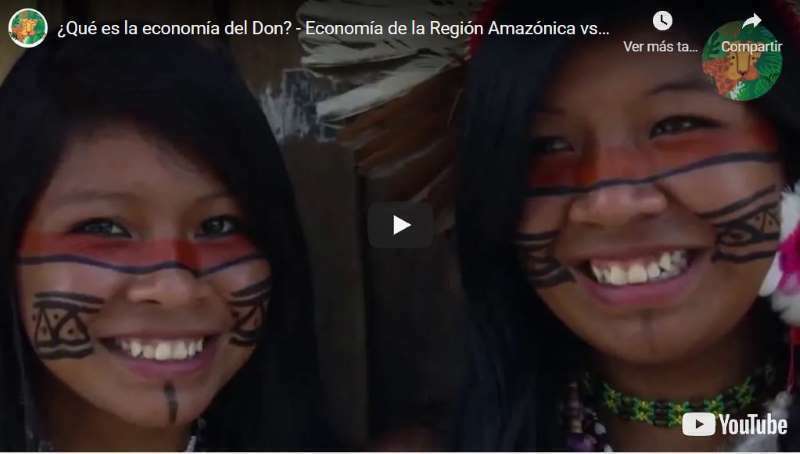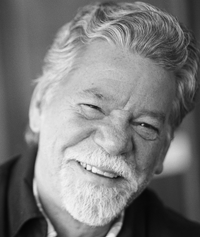
Transcription
“…they move within a model that has nothing to do with democracy, or socialism, or anything else. But they also have their models that relate to exchanges, for example, the gift economy.”
The economy of the Don
The economy of the Don is neither an economy of accumulation nor of consumption. I’m in a capitalist world where the person is richer to be more powerful. In the indigenous world, wealth does not come from the accumulation of goods because there is no way to accumulate goods. Property is collective property and I cannot accumulate land; I cannot accumulate tradable goods, that is, goods subject to commercialization, because there is no system of conservation or transportation of these goods.
So I have to appeal to a system called the gift economy. It is that when I collect a piece or a booty, or a piece of game that I catch, an animal that not only satisfies my food needs, but since I do not have a way to preserve that animal, the remains, what is left, I distribute it. This is called the gift economy.
And I do it not with the purpose of you paying me, but with the purpose of a future retribution that does not have to be equivalent, but I deliver to you. And what I am appealing to is a sense of solidarity that the indigenous people understand very well. When I kill, for example, an animal, of course, with all the rules of incursion in the jungle, at home or fishing. When I ask permission from a tutelary God, the God of evil, I kill him and collect the piece and satisfy the needs of my family group. When I have enough of the rest, I give it to the other, to my neighbor. Everyone benefits. Why? Because there is no way to keep it, whereas in a capitalist society I have money and I put it in a bank, you understand? I have equivalents of value, which is money, they have no money. At the time of the 19th century, the Indians of the boom, of rubber, were not paid with money, they were paid with hunting weapons, they were paid with work tools, utensils, they were paid a little with clothes.
But since clothing is not inscribed within the consumer system as we see it, then they simply made do with it. For them there is no medium, the mediator money as a transaction element of the commercialization of the good. Money is not a commodity. Ordinarily, money is an intermediary between goods. What is happening? In the capitalist system? Money becomes a commodity. Which is what Karl Marx proposes. Well, for the indigenous people that has no value. They don’t have those systems. The systems are systems that increase the prestige of the family group, which is different. For example, a spondylus shell for the indigenous people of the coast represents a prestige system. A prestige system is, for example, in having something that for others means nothing, but what it does is to increase prestige, to increase power. Because what do people look for in any society? Authority, power, power over the other. But in indigenous groups there is no power over the other for individual benefit, but power for the other to, we would say, serve as a guide for the cultural process.
While we do not. We take a commodity, we accumulate the commodity to gain authority and power within a highly stratified society based on commodity functions. They don’t, they have nothing to do with it, the merchandise has no value.
– They are two systems that collide.
– They collide, but there is a transitional process, i.e., the systems collide for a society that has little contact. But as societies are not fixed, static, but are societies in change, society is assimilating to capitalist cultural models and in that they are models of cultural assimilation, changes are produced. Then the individual begins to produce and receive a salary to buy goods. In other words, he leaves the gift economy and enters the capitalist, exchange economy. And he starts dressing like you, you know? he leaves part of his culture and begins to take on another culture. That is why it is called trans-culturalization. Culture is nothing more than a model, culture is nothing more than a model of how I assimilate and transmit values from one generation to another generation in order to differentiate myself from others and to be coherent within my own group, which in a way is a form of identity.
Identity is nothing more than a strategy that I use to cohere myself as a group and differentiate myself from the other, to say I am different from you. That is identity.
– But, a person who suddenly does not know well, maybe would be thinking that you are talking about a speech where you are defending, or not comparing with socialism, or let’s say you are defending a mode of culture that Marx, the younger one, who wrote about…. That inspired by ethnicities.
– The young Marx spoke of a primitive model of community that was the pre model, the model prior to a model that is called, or you can call it the hydraulic model. This is where the slave model comes from. From this comes the capitalist mode of production, the socialist mode of production and the communist mode of production, which for Karl Marx were different. Karl Marx does not speak of communism from the political point of view, he speaks of a mode of production and he schematizes it in terms of several variables, one variable is the means of production and the control that you exercise over those means of production, the development of the productive forces, that is, the ideology that is behind the productive force and the models are changed from one model to another when the means of production and its control enter into contradiction with the relations of its production and the development of the productive forces. When that comes into contradiction, it clashes and a new mode of production is created. For an indigenous person, changes also occur, but it is not governed by the Marxist model.

Dr. Rafael Cartay is a Venezuelan economist, historian, and writer best known for his extensive work in gastronomy, and has received the National Nutrition Award, Gourmand World Cookbook Award, Best Kitchen Dictionary, and The Great Gold Fork. He began his research on the Amazon in 2014 and lived in Iquitos during 2015, where he wrote The Peruvian Amazon Table (2016), the Dictionary of Food and Cuisine of the Amazon Basin (2020), and the online portal delAmazonas.com, of which he is co-founder and main writer. Books by Rafael Cartay can be found on Amazon.com
This post is also available in:
![]() Español (Spanish)
Español (Spanish)
